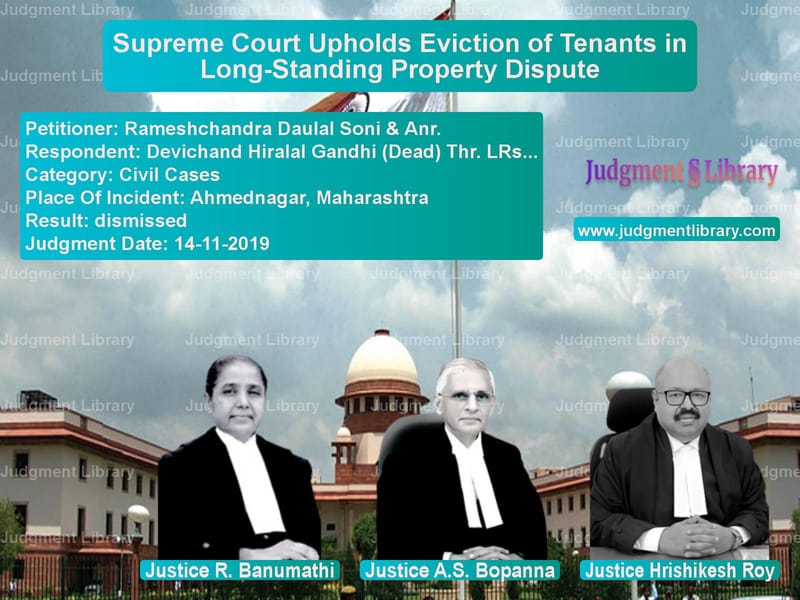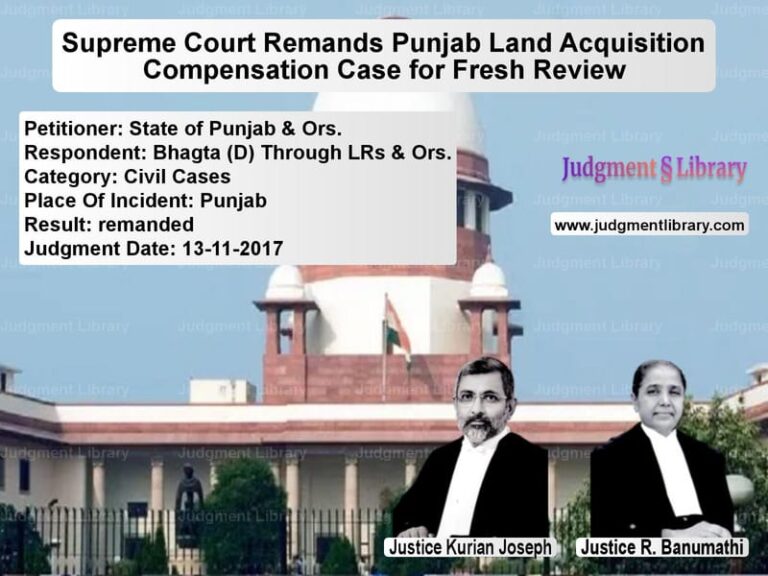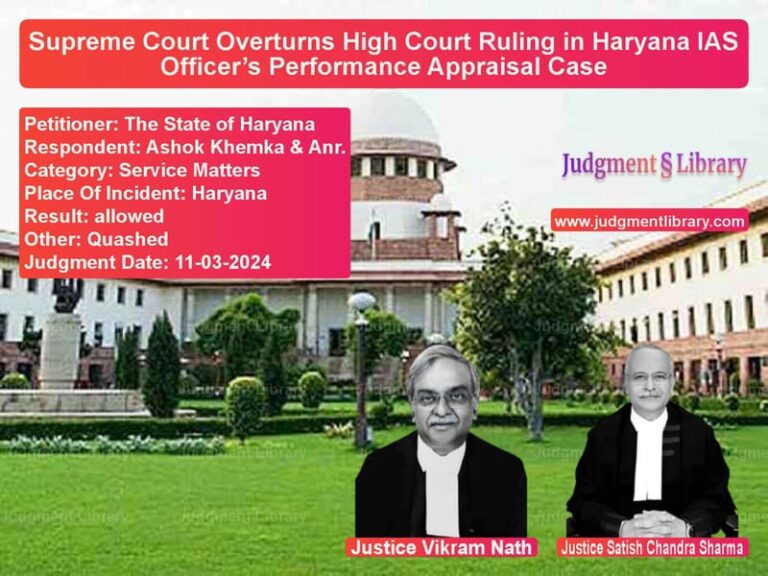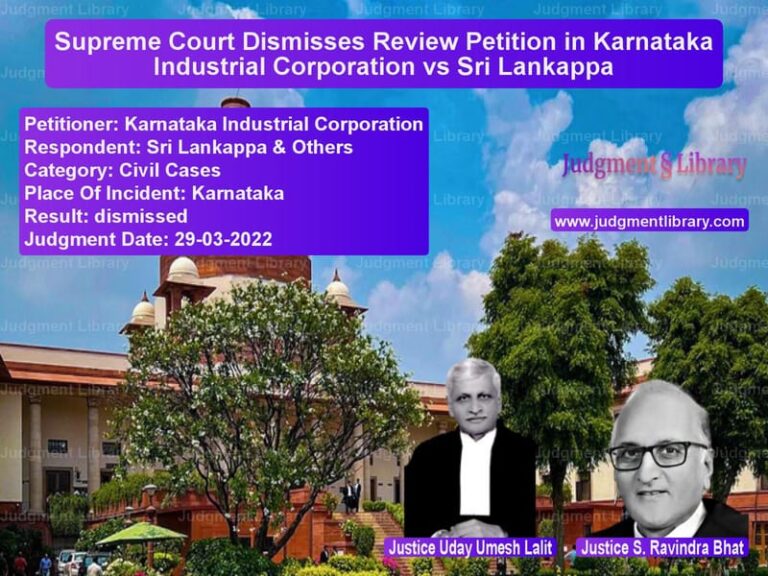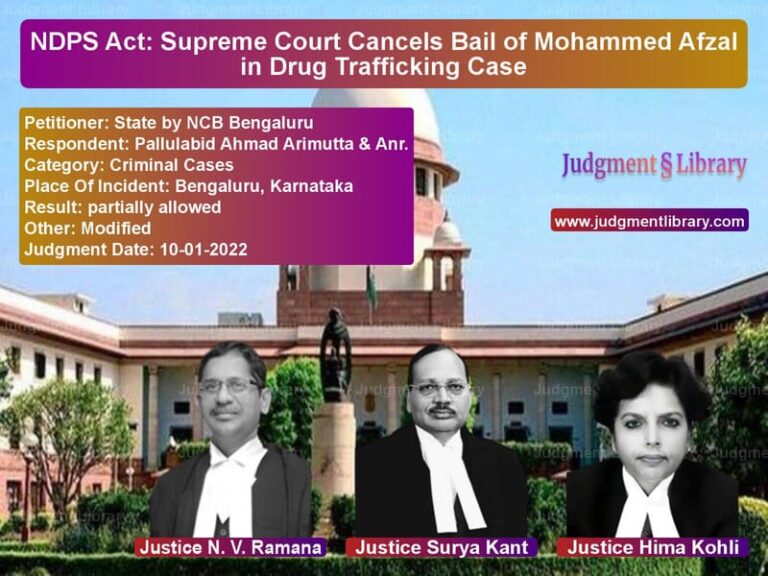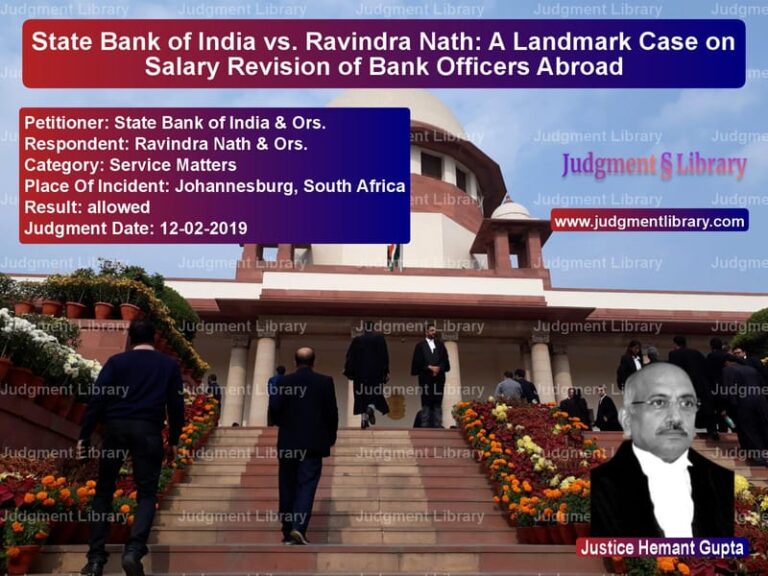Supreme Court Upholds Eviction of Tenants in Long-Standing Property Dispute
The Supreme Court of India recently upheld the eviction of tenants in a prolonged property dispute in the case of Rameshchandra Daulal Soni & Anr. v. Devichand Hiralal Gandhi (Dead) Thr. LRs. Smt. Gulabbai Devichand Gandhi & Ors.. The legal battle revolved around the rightful ownership and tenancy rights of a property in Ahmednagar, Maharashtra, which had been under litigation since 1989.
Background of the Case
The suit property, originally owned by Deshmukh Brothers, was sold to the plaintiff, Devichand Hiralal Gandhi, on August 8, 1986. At the time of purchase, the predecessor of defendants No.1 and 2 was a tenant in the property, paying an annual rent of Rs.31. After the purchase, the plaintiff informed the tenants and demanded rent payments, which were not complied with. Alleging default and unauthorized subletting, the plaintiff filed Regular Civil Suit No. 253/1989 seeking eviction.
The trial court ruled in favor of the plaintiff and ordered the eviction of all defendants, including alleged sub-tenants (defendants No.3 to 7). The judgment was upheld by the Principal District Judge, Ahmednagar and later by the Bombay High Court, Aurangabad Bench in Civil Revision Applications No. 112/2012, 113/2012, and 114/2012. The tenants challenged the High Court’s order before the Supreme Court.
Key Legal Issues
- Did the tenants have a valid right to continue occupancy?
- Did the plaintiff validly terminate the tenancy?
- Was the property used in accordance with its original lease terms?
- Were some of the defendants trespassers rather than sub-tenants?
Arguments by the Petitioners (Tenants)
The tenants (defendants No.1 and 2) argued that:
- The lease was originally executed in 1928 for 31 years, and despite its expiry in 1959, they continued as statutory tenants under the Bombay Rent Act.
- The plaintiff had failed to issue proper notice of termination.
- The trial court failed to recognize that the premises had been continuously used for commercial purposes.
- The eviction suit was barred by limitation.
- Legal heirs of the original tenant (daughters of defendant No.1) were necessary parties and had not been included in the suit.
Arguments by the Respondents (Plaintiff)
The plaintiff countered these claims, arguing that:
- The tenants had defaulted in rent payment.
- The suit premises had not been used for its original intended purpose (cotton storage).
- Unauthorized sub-tenants (defendants No.3 to 7) had occupied the premises without consent.
- The defendants’ claim that the tenancy had passed to all legal heirs was an afterthought.
Supreme Court’s Observations
1. Validity of Tenancy Termination
The Court held that the plaintiff had lawfully terminated the tenancy by serving notices and following due process under the Bombay Rent Act. The tenants had failed to respond or pay rent despite repeated demands.
2. Unauthorized Subletting
While the plaintiff had claimed that defendants No.3 to 7 were sub-tenants, the Court found insufficient evidence to support this. However, it ruled that these defendants were trespassers who had no legal right to occupy the property.
3. Necessity of Legal Heirs as Parties
The tenants argued that all legal heirs of the deceased original tenant should have been made parties. However, the Court found that the two sisters of defendants No.1 and 2 had never claimed tenancy rights during the proceedings. The Court stated:
“Neither at the first instance when the notice was issued nor in their reply did the defendants claim that other legal heirs had tenancy rights. This argument is a clear afterthought.”
4. Non-Use of Property for the Intended Purpose
The lease agreement specified that the premises were to be used for cotton storage. Evidence showed that the property had not been used for this purpose for years. The Court held that:
“The defendants admitted that the business of cotton ginning had ceased long ago. The premises were instead being used to store cement and agricultural equipment. This constitutes a change in use, violating the lease agreement.”
5. Delay in Raising Agricultural Tenancy Claim
One of the defendants (defendant No.5) later claimed tenancy rights under the Maharashtra Tenancy and Agricultural Lands Act (MTAL Act), arguing that the Civil Court had no jurisdiction. The Supreme Court rejected this argument, stating:
“Defendant No.5 never raised this issue before the trial court, nor was any evidence produced to support the claim. The argument was raised only at the execution stage to delay proceedings.”
Supreme Court’s Verdict
The Supreme Court dismissed the appeals and upheld the eviction order. It ruled that:
- The tenants had no legal right to continue possession.
- The suit was validly filed and not barred by limitation.
- The claim of agricultural tenancy was baseless.
- The execution of the eviction order must proceed.
Impact of the Judgment
This ruling has significant implications:
- It reinforces the importance of proper lease usage and rent payment.
- It clarifies that afterthought claims (such as agricultural tenancy) cannot be used to delay eviction.
- It upholds the principle that legal heirs must assert their rights in a timely manner.
- It reaffirms that Civil Courts have jurisdiction unless a tenancy claim is proven.
Conclusion
The Supreme Court’s decision in Rameshchandra Daulal Soni v. Devichand Hiralal Gandhi highlights the importance of adhering to lease terms and timely payment of rent. It also sends a strong message against delaying tactics in eviction proceedings. The ruling ensures that property owners can reclaim their premises lawfully, preventing illegal occupation and misuse of tenancy rights.
Petitioner Name: Rameshchandra Daulal Soni & Anr..Respondent Name: Devichand Hiralal Gandhi (Dead) Thr. LRs. Smt. Gulabbai Devichand Gandhi & Ors..Judgment By: Justice R. Banumathi, Justice A.S. Bopanna, Justice Hrishikesh Roy.Place Of Incident: Ahmednagar, Maharashtra.Judgment Date: 14-11-2019.
Don’t miss out on the full details! Download the complete judgment in PDF format below and gain valuable insights instantly!
Download Judgment: Rameshchandra Daulal vs Devichand Hiralal Ga Supreme Court of India Judgment Dated 14-11-2019.pdf
Direct Downlaod Judgment: Direct downlaod this Judgment
See all petitions in Property Disputes
See all petitions in Landlord-Tenant Disputes
See all petitions in Specific Performance
See all petitions in Judgment by R. Banumathi
See all petitions in Judgment by A. S. Bopanna
See all petitions in Judgment by Hrishikesh Roy
See all petitions in dismissed
See all petitions in supreme court of India judgments November 2019
See all petitions in 2019 judgments
See all posts in Civil Cases Category
See all allowed petitions in Civil Cases Category
See all Dismissed petitions in Civil Cases Category
See all partially allowed petitions in Civil Cases Category

